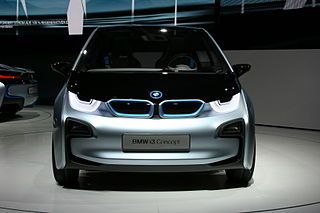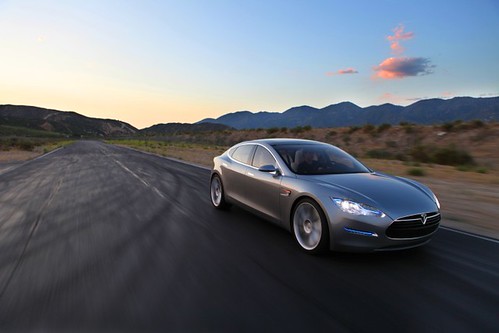From Guest Blogger Jake Fisher: Seven Myths About the Electric Car Phenomenon

MYTH #1: They’re Only for Rich People
Image via Flickr by Al Abut
Probably started by someone who apparently hates change, this rumor has been fueled by the value of certain cars, such as the 2012 Fisker Karma, which retailed at a base price of $102,000. The Tesla Model S (which also has an expensive so-called bricking controversy associated with it) doesn’t help matters either, as it retails at $95,400 and $105,400, and that’s prior to any federal and local government tax credits and incentives.
What wasn’t mentioned, however, were the much more reasonable price tags on the Chevrolet Volt and the Nissan Leaf. The Chevrolet Volt retails at $43,700, and the Nissan Leaf retails at $35,430. Both options are way more affordable than the Fisker Karma and Model S, and leasing options for the Volt and Leaf start as low as $199 a month after $2,000 down.
Verdict: False.
MYTH #2: It Will Increase My Utility Bill
This particular “myth” is basically true. You’ll be using more energy, so your energy bill will increase. Sorry about that. You know where the savings come in? At the pump. If you use the energy rates found on sites like SaveOnEnergy.com, you’ll save a ton on energy while simultaneously saving at the pump. If you drive a battery-only car for 12,000 miles, you’ll pay an extra $25 or so on your utility bill. At the pump, however, you’ll save far more — about $100.
Keep in mind that some utilities charge more for energy use during peak hours, so you should check and see if your provider offers special off-peak hours. For instance, in California, you could pay up to as little as $13 in a month to charge your electric car.
Verdict: True, but you save money elsewhere.
MYTH #3: Government Rebates Favor the Rich
To help mitigate the price of the cars (the Nissan Leaf starts at nearly $33,000), the Government offered a tax credit of up to $7,500 for the first 200,000 buyers of each model. If you can’t afford one now, have patience — all new technology initially costs more up front. Remember when Blu-ray players were nearly $400? CD Players, when they first came out, were nearly $1,000.
Verdict: True, for a limited time.
MYTH #4: Electric Cars Handle Poorly
There’s no telling where this rumor came from, but electric cars feel similar to a regular car. Car and Driver stated that the Chevrolet Volt “drives surprisingly well, with a reassuringly steady suspension.” They had some issues with the Leaf’s short range, but it worked smoothly in stop-and-go traffic.
Verdict: False.
MYTH #5: You’ll Get Stranded
A lot of people seem to fear electric cars because they’re scared of being stranded in the middle of nowhere. This couldn’t be further from the truth. Some electric cars have a gas backup, so if you’re that worried, you can have the gas in your car to switch to if your battery runs out.
For fully electric cars, though, it’s a bit different, but it’s still not an issue. A complete charge for a fully electric car takes about 10 hours when you’re using a standard outlet. It takes half as long with a home 220-volt station, but that’ll set you back $2,000. There’s plans in place for the Government to set up 15,000 pay-as-you-go chargers in public places, so the infrastructure will almost certainly be in place for cross-country trips soon.
Verdict: False, with proper planning.
MYTH #6: Lithium-ion Auto Batteries are as bad as Lithium-ion Laptop Batteries
This one has a little weight to it. Lithium-ion batteries are a bit sluggish in cold weather and turning up your air conditioning, heat, or stereo will reduce your range. Even more worrisome is that there’s really no lifetime estimate on them.
As with everything, battery technology continues to evolve, and by the time you read this, there may have been an announcement regarding a faster charging and more reliable battery. Until then, however, you’ll have to feel secure knowing that both the Chevrolet Volt and Nissan Leaf come with eight-year battery warranties.
Verdict: True, but you’re covered
MYTH #7: Our Electric Grid Can’t Handle the Extra Burden
Simply put: Electric cars wouldn’t have been released to the public if there was any sort of chance they’d take out the electric grid. Government regulators just wouldn’t have allowed it, so blackouts are extremely unlikely. Newer technology helps distribute the energy evenly, and some home stations operate during off-peak hours. Smart chargers will decide when to charge your electric car based on the time and distance that you travel, local energy rates, and the electricity demand in your neighborhood.
Verdict: False
As you can see, there’s a lot of misinformation out there. If you plan on commuting short distances around the city, consider getting an electric car — you’ll save a ton of money in the long run!

